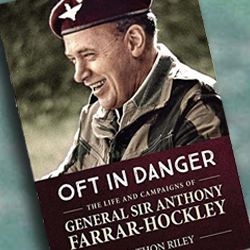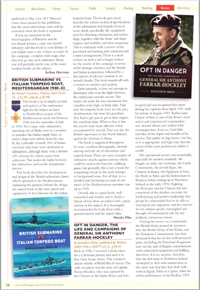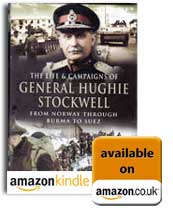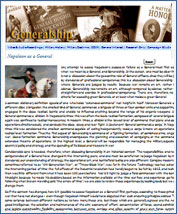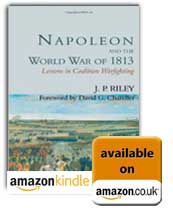
Lieutenant-General Jonathon Riley CB DSO PhD MA FRHistS
Book Reviews
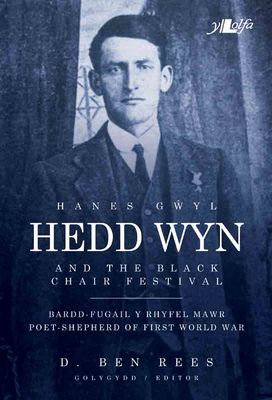
Hanes Gŵyl Hedd Wyn / Hedd Wyn and the Black Chair Festival
D. Ben Rees
Bardd-Fugail y Rhyfel Mawr / Poet-Shepherds of the First World War
Wele gyfrol fach sydd yn fwrlwm o ddeunydd eithriadol o ddifyr a phwysig yn hanesyddol a gyhoeddwyd yn sgil cynnal Gŵyl y Gadair Ddu o fewn Parc Penbedw yn ystod mis Medi 2017.
This slim volume abounds with exceptionally interesting and historically significant material published following the convention of the Black Chair festival at Birkenhead Park during September 2017.
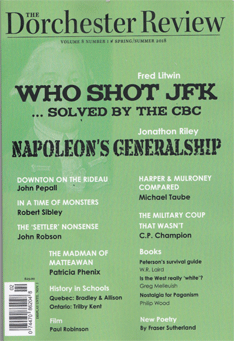 In a short article, there is not space to expound the study of generalship.
In a short article, there is not space to expound the study of generalship.
However, it is necessary to begin by highlighting a few benchmarks, giving some words of caution about judging the likes of Napoleon by modern standards, and then passing on to examine briefly Napoleon’s performance at various levels of war.
For those wishing to learn more, I can only commend my own book, from which this article is drawn, Napoleon as a General.
Dorchester Review - 'Napoleon as a General' »
Review - Oft In Danger
Published in the September 2016 edition of Miniature Wargames
By John Drewienkiewicz
Back in 1956, I received a book token for a Christmas present and used it to buy Great Escape Stories. This consisted almost wholly of World War II stories. The only exception was the story of Captain Farrar-Hockley, who was captured by the Chinese at the Imjim River and who escaped and was recaptured five times during his captivity from April 1951 until his release in August 1953. Rather later, I knew him as one of the Army's most senior and experienced commanders, one around whom you walked with circumspection. Even so, I had little real idea of the depth and breadth of his service. The public at large knew a lot less, so it is appropriate and high time that the career of this most professional soldier is retold.
His operational service was remarkable, especially by modern standards. He fought, in order, the Germans, the Greek Communists, the Jewish Irgun, the Chinese in Korea, the Egyptians at Suez, the Arabs in Aden and the Indonesians in Borneo, before ending up in Northern Ireland in the early 1970s. Fighting the Germans and the Chinese left him convinced of the absolute necessity for hard training and positive leadership. Any group he commanded had to be able to overmatch any opponent, and his concern for his soldiers greatly outweighed any thought of trimming his sails for any political, extraneous reason.
During his service as a commander the British Army poured its resources into the British Army of the Rhine and the European Commitment, but then demanded that the far less well-resourced parts, including the Parachute Regiment, sort out the end of Empire commitments with outmoded equipment and baffling directives. It is no surprise, therefore, that the first units in Northern Ireland attempted to deal wi ht insurrection in the same way that they had dealt with riots in Egypt, Aden or Cyprus. After his stellar performance in the Radfan, TFH became the poster boy of the unresourced half of the Army. But in the words of the author, at the conclusion of TFH's time in Northern Ireland in 1970, "He have clear military advice to his political master and expected in return that be a consistency of approach, a statement of strategic objectives and then a reasonably hands-off policy to allow the military the freedom of action to proceed."
But this was not how he was viewed within the military establishment. Field Marshal Carver's view was: "In a campaign so close to home and at such an early stage. his advice was often too blunt and his reaction to fudging the issues caused more than a little irritation by those whose responsibility was to confront issues and take decisions, but who seemed incapable of doing so."
He was an uncomfortable presence, an outsider to the system and not properly house-trained, a man of the frontier, rather than of the drawing room.
He was eventually allowed a stint in Germany, but as an outsider he was unable to reform the entrenched mindset that he found there. He was not allowed onto the Army Board (at a time when the Army Board was noted for selecting clubbable chaps in its own image). despite the fact that his record of service qualified him to speak truth to power in a way that others, some of whom had never heard a shot fired in anger, could not. This is somewhat reminiscent of the position of Kitchener in 1917. The difference was, of course, that there was no national crisis that demanded his presence.
Instead, he was sent to a senior NATO appointment in Norway, where he was forced to watch events unfolding at home that he would have been well able to assist with. But by now, his reputation was that of a thundering Old Testament Prophet who brooked no compromise. That said, he must have taken comfort from the successes of the Paras in the Falklands, which would be seen as full vindication of his legacy. Moreover, the fact that a Parachute Regiment Officer, Rupert Smith, was selected to lead the UK's Armoured Division in the First Gulf War, was testimony to the fact that the 'Heavy Metal' side of the Army was still not able to grow its own talent in-house.
This is a very good pro trait on an exceptional British soldier. He experienced more than any of his contemporaries, and while he was no innovator, his vast repertoire or experience, all registered mentally, gave him a comprehensive 'play list' that he was able to draw on.
Jonathon Riley has given us a comprehensive portrait of TFH. Indeed, there is almost too much detail in some areas, which can detract from the thread of the story, and yet it is a bit thin in others. The man who springs from the page was indeed a warrior whose formative years were spent in areas too dangerous for the media, before the hierarchy fully developed its 'long screwdriver', and before the public forgot that armies must be prepared to take losses in order to keep the nation safe. It can confidently be said that TFH was someone who gave the full measure of devotion to his country and his soldiers and who never flinched from his duty. We are indebted to Jonathon Riley for reminding us of what it was like to soldier in the middle of the last century, before aversion to risk and lack of funding emasculated the British Armed Forces.
John Drewienkiewicz
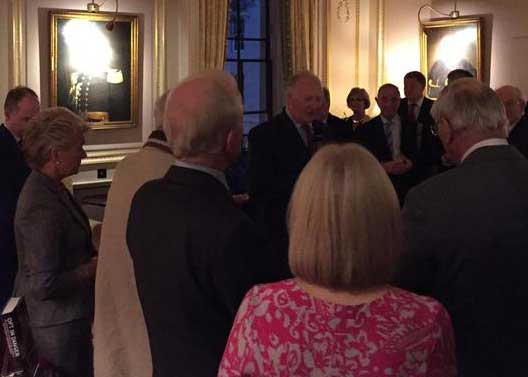 OFT IN DANGER General Sir Anthony Farrar-Hockley by Jonathon Riley
OFT IN DANGER General Sir Anthony Farrar-Hockley by Jonathon Riley
September 23rd 2015
Jonathon Riley addresses guests at the launch of Oft in Danger at the Orient Club
Detail on the book 'Oft in Danger' »
The First Colonial Soldiers:
Volume 2: the Americas and the Caribbean
These volumes deal with the colonies in the New World and the temporary holdings in that part of the world. Discussed are the militias of those colonies, the expeditions and battles, the regular forces sent from England, and much more. This volume is to be published in March 2015.
Though designated 'Volume 1' and 'Volume 2", both volumes can be read independently of each other as each comes with its own introduction, list of references, indices, illustrations and maps.
The First Colonial Soldiers:
A Survey of British Colonies and Their Garrisons, 1650 - 1714
Volume 1: the British Isles, Europe, Asia and Africa. With an
introduction by Professor John Childs, this volume covers the Channel Islands, the Isle of Man, Dunkirk, Mardyck, Gibraltar, Minorca, Tangier, the West African settlements, St Helena and the Far Eastern outposts of the Honourable East India Company.
The books provide full lists of the officers the regular and militia forces in the colonies and overseas territories, including biographical details.
THE LAST IRONSIDES:
The English Expedition to Portugal, 1662-1668
"The English soldiers earned a dearly bought reputation as highly
professional, committed and brave soldiers who along with their likewise effective French brothers-in-arms were instrumental to the success in driving out the Spanish... The book is well illustrated with maps, plans, contemporary prints and present-day photos."
Charles Blackwood, Fortress Study Group Magazine
Read More Reviews here »
THE LIFE AND CAMPAIGNS OF GENERAL HUGHIE STOCKWELL:
From Norway, through Burma, to Suez
"As a senior officer in the modern army, Jonathon Riley has insight into the qualities necessary to succeed as a professional soldier, and he brings this to his detailed and entertaining narrative, which is largely a telling of battle stories rather than a personality study. "
Jon Latimer
NAPOLEON AS A GENERAL:
Command from the Battlefield to Grand Strategy
"As the very model of a modern lieutenant-general, Jonathon Riley understands the qualities necessary to succeed as a professional soldier, and he shares his knowledge here in a superb study of Napoleon's qualities as a commander. Napoleon as a General is not another biography, but a detailed treatise on the many and varied demands made on top commanders throughout history"
Jon Latimer
Review Essay - Recent Writing on Napoleon and his Wars By Charles Esdaile
1. The Wars Against Napoleon (Michel Franchesci & Ben Weider)
2. The War of Wars
(Robert Harvey)
3. Napoleon as a General (Jonathon Riley)
Given what has been said in the preceding paragraphs, it is with a feeling of relief that one moves on to the third book that is reviewed here, namely Jonathon Riley's Napoleon as a General: Command from the Battlefield to Grand Strategy. Written by a high-ranking British officer with a wealth of front-line experience in Bosnia, Sierra Leone, Iraq and Afghanistan who has already published an interesting study of the campaign of 1813, this represents a major shift in tempo. Consciously eschewing the chronological approach of the past, Riley has structured his book on a series of thematic chapters on such issues as strategy, tactics, logistics, counter insurgency and coalition management, backed up by several detailed case studies on individual campaigns and a useful introduction which looks at the general issue of generalship and command....
The full review may be accessed in The Journal of Military History 73 (January 2009): 209-220
NAPOLEON AND THE WORLD WAR OF 1813:
Lessons in Coalition Warfighting
"An officer in the British army who commanded a battalion during the 1995 Balkan War, the author of this book has had firsthand experience in waging war as part of a multinational coalition. In Napoleon and the World War of 1813, he argues that the wars in Europe and North America during 1813 provide the best example for studying coalition warfare as a “historical phenomenon” "
Michael V. Leggiere, Louisiana State University in Shreveport
A MATTER OF HONOUR:
The Life, Campaigns and Generalship of Isaac Brock
"Given my trepidation, what a pleasure it was to be treated to General Jonathon Riley's most interesting and entertaining book about the life and times of General Sir Isaac Brock, the "Saviour of Upper Canada." Riley is a lucid and gifted writer who knows how to both inform and tell a story."
Darrell Bricker
Read More »
Additional Reviews - "A Matter of Honour" ...
"As War of 1812 historian Donald E. Graves, notes in his foreword, A Matter of Honour is “a study of a good soldier by another good soldier” (p. ix). Riley’s experience in the interplay between regular troops and indigenous tribal fighters and his academic training provides him with a unique perspective towards his topic."
Major John R. Grodzinski, Royal Military College of Canada
![]() Read more
Read more
"Riley's analysis displays an understanding of military terminology, career development, tactics, and strategy from one familiar with both eighteenth-century and modern armies. .... Thus when he writes that “the very essence of generalship at the operational level” is “determining those things that are going to be decisive, and bringing these circumstances to pass”, the reader knows that Riley speaks from both knowledge and experience."
David Curtis Skaggs,
Professor emeritus of History Bowling Green State University
![]() Read review
Read review
"This new biography will appeal especially to military history buffs, for Brock is portrayed by a distinguished modern British Lieutenant-General. This Brock is envisioned through the eyes of a soldier - indeed one, as Canadian historian Donald Graves notes in his introduction, who "may have more military experience than his subject."
The Ontario Historical Society
![]() Read review
Read review
